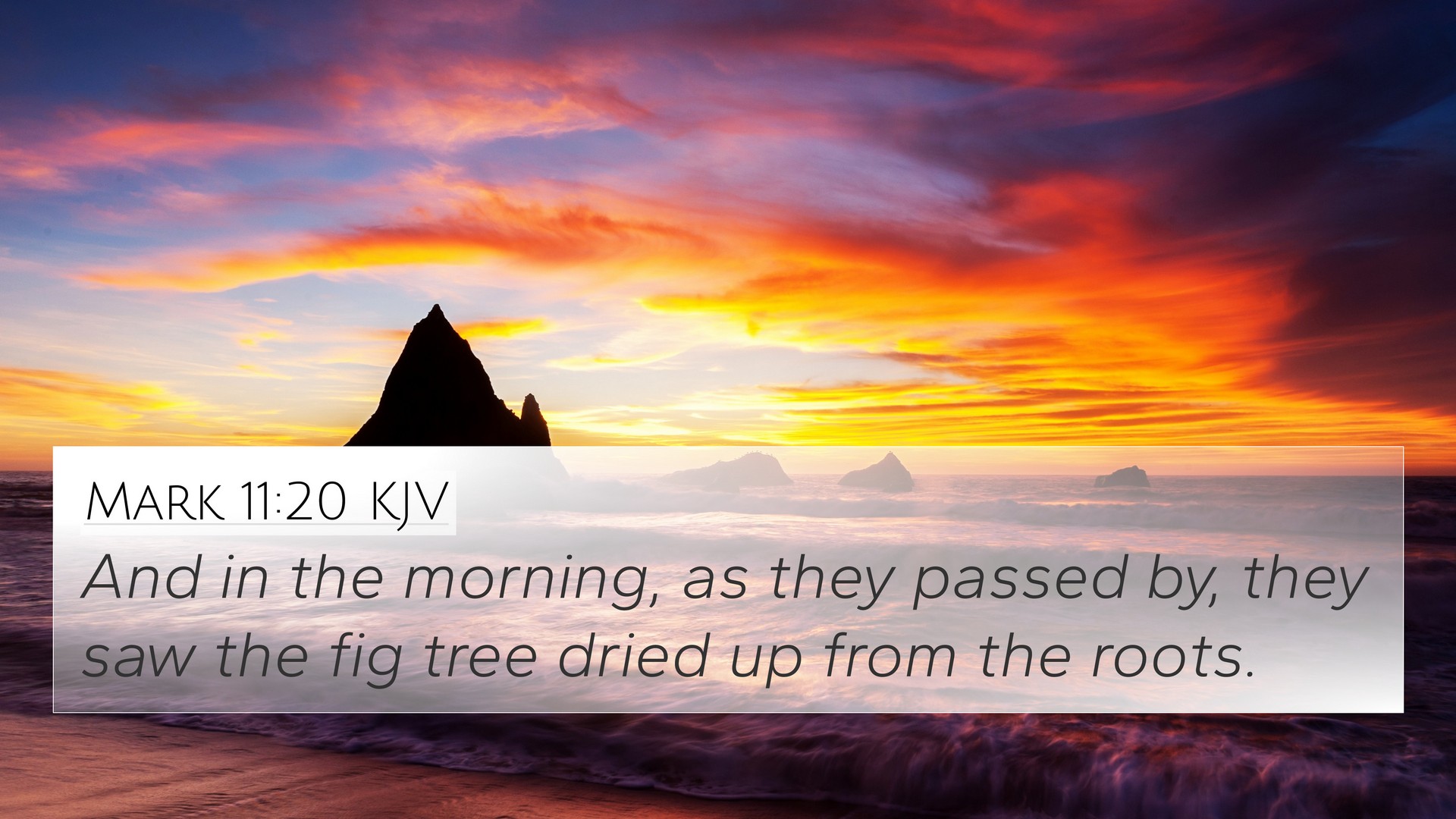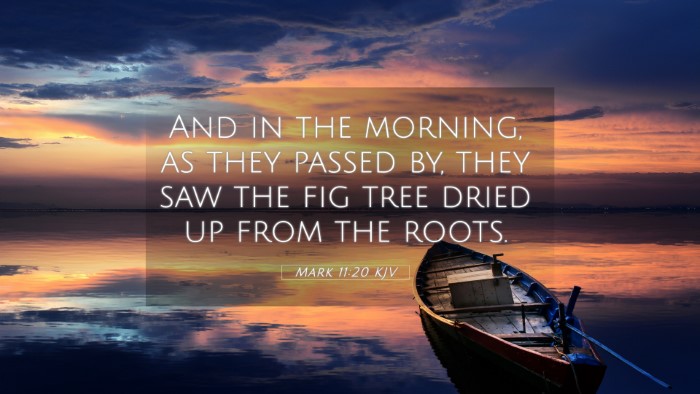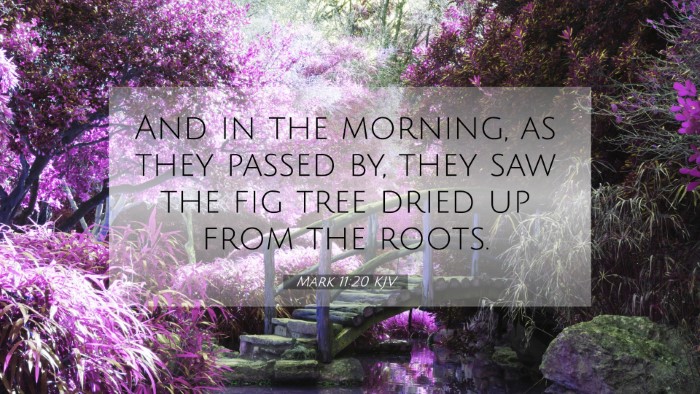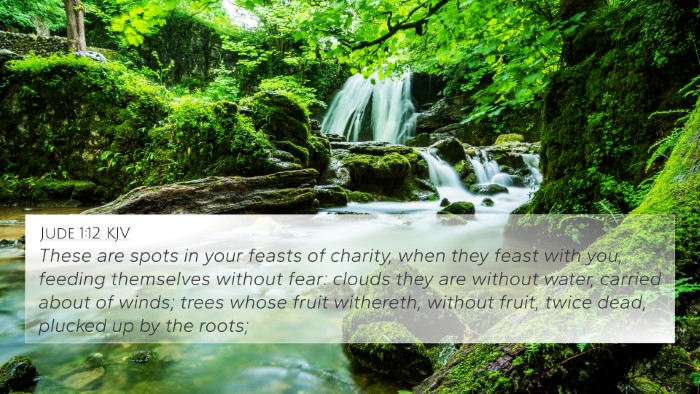Understanding Mark 11:20
Mark 11:20 states:
"And in the morning, as they passed by, they saw the fig tree dried up from the roots."
Overview of the Verse
This verse is a part of the narrative where Jesus curses the fig tree as a symbolic act demonstrating God's judgment on unfruitfulness. The drying up of the fig tree serves as a profound lesson about faith, expectation, and the consequences of spiritual barrenness.
Combined Insights from Public Domain Commentaries
Insights from various public domain commentaries reveal deeper meanings within this verse:
- Matthew Henry: He explains that the fig tree represents Israel, and its unfruitfulness symbolizes the spiritual condition of the Jewish nation. Just as the fig tree was cursed for not bearing fruit, so too would Israel face judgment for failing to produce the spiritual fruits expected of it.
- Albert Barnes: Barnes emphasizes the importance of faith in this passage. He notes that the disciples were astonished by the quick response of the fig tree to Jesus’ words, illustrating the power of faith and the potential outcomes when one holds unwavering belief.
- Adam Clarke: Clarke discusses the principle of faith that underlies this miracle. He points out that true faith can move mountains and accomplish what seems impossible; thus, this act inspires believers to nurture their faith, believing in the unseen and impossible.
Thematic Connections
Mark 11:20 offers thematic connections to other significant Bible verses:
- Matthew 21:18-22: This passage recounts a similar event where Jesus curses the fig tree, emphasizing the themes of faith and expectation.
- John 15:2: Here, Jesus teaches that every branch in Him that does not bear fruit is taken away, linking the theme of spiritual productivity with Mark 11:20.
- Isaiah 5:1-7: This Old Testament passage describes God’s expectations of Israel as His vineyard, underscoring the consequences of unfruitfulness.
- Luke 13:6-9: The parable of the barren fig tree further illustrates God's patience and ultimate call for fruitfulness among His people.
- James 2:17: This verse teaches that faith without works (or fruit) is dead, resonating with the message of Mark 11:20.
- Galatians 5:22-23: Paul speaks of the fruits of the Spirit, reinforcing the idea that believers are expected to exhibit spiritual fruit.
- Revelation 2:5: In addressing the church at Ephesus, the call to remember their first love is reminiscent of the call to be fruitful and vigilant concerning one’s spiritual state.
Bible Verse Cross-References
Exploring cross-references helps in understanding the interconnectedness of scripture:
- Psalm 1:3: “And he shall be like a tree planted by the rivers of water, that bringeth forth his fruit in his season; his leaf also shall not wither…” – This verse highlights the importance of being fruitful.
- Matthew 7:17-20: “Even so, every good tree bringeth forth good fruit; but a corrupt tree bringeth forth evil fruit…” – A direct connection to the theme of being fruitful.
- Romans 11:20: This verse speaks of the consequences of unbelief, paralleling the judgment symbolized by the dried fig tree.
- Philippians 1:11: “Being filled with the fruits of righteousness…” – This emphasizes the character of the believer to produce righteous fruit.
Conclusion
Mark 11:20 serves as a powerful reminder of the importance of faith and the necessity of spiritual productivity in the life of a believer. Through this verse and its cross-references, we see the profound connections and lessons that can be drawn regarding faith, expectation, and Divine judgment. It is crucial to remain vigilant in nurturing our spiritual lives, ensuring that we bear good fruit in alignment with God's desires.
Tools for Bible Cross-Referencing
To further explore the connections between Bible verses, various tools and resources can be employed:
- Bible Concordance: Useful for locating specific keywords and themes across scripture.
- Bible Cross-Reference Guide: Helps in identifying related scriptures that resonate with a specific passage.
- Cross-Reference Bible Study: A methodical approach to studying relationships between verses.
- Comprehensive Bible Cross-Reference Materials: Available both in print and online, these resources offer extensive references.
Finding Cross-References
When looking for cross-references, consider these approaches:
- How to Use Bible Cross-References: Familiarize yourself with tools and tactics for navigating scripture for deeper understanding.
- Identifying Connections between Old and New Testament: Analyze themes and patterns that appear throughout the canonical books.
- Detailed Cross-Reference Between Gospels: Investigate similar events or teachings found within the four Gospels for a comprehensive view.
In conclusion, the study of Mark 11:20, enriched by cross-referencing, provides believers with invaluable insights into their faith journey and the importance of being fruitful in their spiritual lives.













